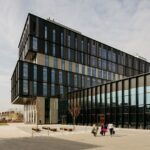A series of concerted actions have been taken in the area of Intellectual Property (IP) – culminating in Bournemouth’s launch of a new IP policy in 2020. This sets out key roles and responsibilities in relation to IP exploitation and management. This is leading to a renewed interest in IP and commercialisation, which we now have the capacity to develop and support. The recently-established Research IP Strategy Evaluation Committee, which is a component of Bournemouth’s IP management framework, plays a key role in identifying IP of potential “societal and economic benefit”. This project tells the story of how an institutional focus and investment in IP and commercialisation is delivering rewards.
1. Please provide a brief description of the KE project/ case study and why you believe it is considered good practice or innovative (and for whom). What challenge were you trying to achieve?
In 2018/19, Bournemouth decided to re-visit its approach to exploitation of its research outcomes. It began a process of building internal infrastructure to enable its academic community to more easily engage more with IP and commercialisation. In late 2020, the newly appointed research commercialisation manager (RCM) set up the Research IP Strategy Evaluation Committee (RIPSEC) to identify and evaluate the potential of IP generated from research to yield “societal and economic benefit” and to confirm appropriate protection strategies for the IP.
We recruited members from professional services and our faculties, choosing representation from a mix of academics in order to cover tech skills, IP, law, entrepreneurship, business administration etc. The Chair of RIPSEC rotates between the executive deans but maintains all the deputy deans, which facilitates the translation of best practice in academic entrepreneurship and KE back to the faculties. The committee assesses the documentation mandated in the IP management framework, which has been assembled by the academic entrepreneur and/or the RCM to make decisions.
Once RIPSEC has made a decision, the members make a recommendation to the next committee in the IP management framework, progressing finally to Bournemouth’s Executive Team, if successful. It’s like a kind of Dragon’s Den and gives academic entrepreneurs wanting to spin-out their IP the chance to present an elevator pitch and answer ‘investor’ questions, which can be very valuable early on for them to work on certain areas and mature their business offering. For those that go on, they will journey through a whole set of processes in the framework including IP protection development, exploitation plan, pre-deal and business planning, leading to implementation of the exploitation plan.
2. Where did the idea for the project/ programme come from? Was this related to a strategic objective? How did you secure senior buy in?
RIPSEC arose directly from the university’s strategic plan, BU2025, which includes an action around creating, protecting and exploiting our IP, so we needed a mechanism to make balanced decisions about handling IP exploitation opportunities at an early stage, which considered both academic entrepreneur and university needs. The IP management framework was a natural follow-on, solving the need for a transparent pathway for our academic entrepreneurs that managed exploitation risks. Creating RIPSEC started a dialogue with senior management around IP commercialisation, which made rolling out the committee and the IP management framework much easier.
3. What impact/ outcome has this project/ activity had on your university? Students? Local economy? Staff? Other external parties, e.g. businesses.
Primarily, the change has been in our approach to KE. Previously, there wasn’t a clear institutional understanding of how IP and our relationship with external partners flows through the whole university. It’s also changing our relationship with the region and industry by internally demonstrating the scope of opportunities and how BU research can play a role in helping companies develop their technologies. Also, it’s helped us to think about ourselves as knowledge providers and how this is applicable to the everyday. We’ve also more recently employed teams which are more outward facing, so that we’re pushing out and growing our network more than we ever did.
The whole IP commercialisation pathway is now standardised across the institution and once a researcher’s proposal is approved by RIPSEC, the university gets more involved in the IP management framework leading to either licensing, start-up or spin-out. Not only has it has been a good way to educate our academic community, but it has also helped us to develop better policies and mechanisms within different faculties, particularly at the idea stage of a research project or KE activity. Our IP management framework is mapped to our policies, so there is clarity in the framework and means that discussions at any stage are handled quickly and efficiently between academic entrepreneur and BU.
4. How did you measure impact?
At the moment, we’re not measuring impact per se except through the standard KEF and HEBCI indicators. However, in tandem with our focus and investment in IP and commercialisation, Bournemouth is developing an integrated mechanism for KPI measurement across all KE activities that will give us improved capacity to evaluate and optimise our strategies to achieve impact.
5. What types of resources were required to implement this project?
We employ one full time research commercialisation manager funded through HEIF to work across the university and coordinate activities, (including securing specialist members for RIPSEC) and gaining support from other professional service and academic teams to help with certain aspects of the research and commercialisation.
This includes asking the business school for market research support, the finance department to help with preparation and/or checking of financial statements for spinouts and our legal department to check all legal aspects and agreements that need to be put in place. It’s possible to contract all of that out but the costs would need to be managed.
6. What are the governance structures in place to oversee it?
Proposals for IP exploitation will usually go through 3-4 other specialist committees, including reviews by finance and resources and audit, risk and governance committees within the framework through before reaching BU’s Executive Team. Each committee will ensure that the correct checks and validations are made on the documentation presented and the entire pathway is overseen by specialist lawyers in our legal team before giving a green light. There are good reasons for having these processes and reviews in place and allows BU to identify and manage risks associated with commercialisation of IP before reaching a final decision.
7. Describe any challenges that you have had to overcome either before, during or after implementing this project?
The changing approach to KE at BU has helped create the right momentum for successful implementation. On the whole, most academics have been supportive. There are always a few that choose not to engage but that’s rare. We have tried to be as transparent as possible with the academic community to manage expectation and make this work. Academic entrepreneurs using RIPSEC and the IP management framework have been positive, and the word has spread, which has helped to bring the community on board and build confidence about where we’re going with commercialisation of our IP.
8. How does this sit alongside other processes/ policies?
It’s been beneficial to have a blank slate to help us establish the framework around the existing policies and their individual processes. Our MO is continuous improvement, so outside the standard review period, if something is not functioning as we would like, we can evaluate and optimise for a smarter approach.
Having senior executive members on RIPSEC as well as other committees, means that they become familiar with the progress of proposals in the framework, so they can speak from a position of knowledge, which strengthens the decision making process and helps to convince others.
9. Next steps?
There is a need to gather evidence that demonstrates success in terms of the numbers of spinouts and licenses in order to build confidence that this is the right way.
We’d also like to work more with our local authorities/organisations focused on economic development, other universities and regional investors to create more entrepreneurship forums and opportunities. I’ve seen the way that certain things work in the US, and I’d like to see that happen here.













